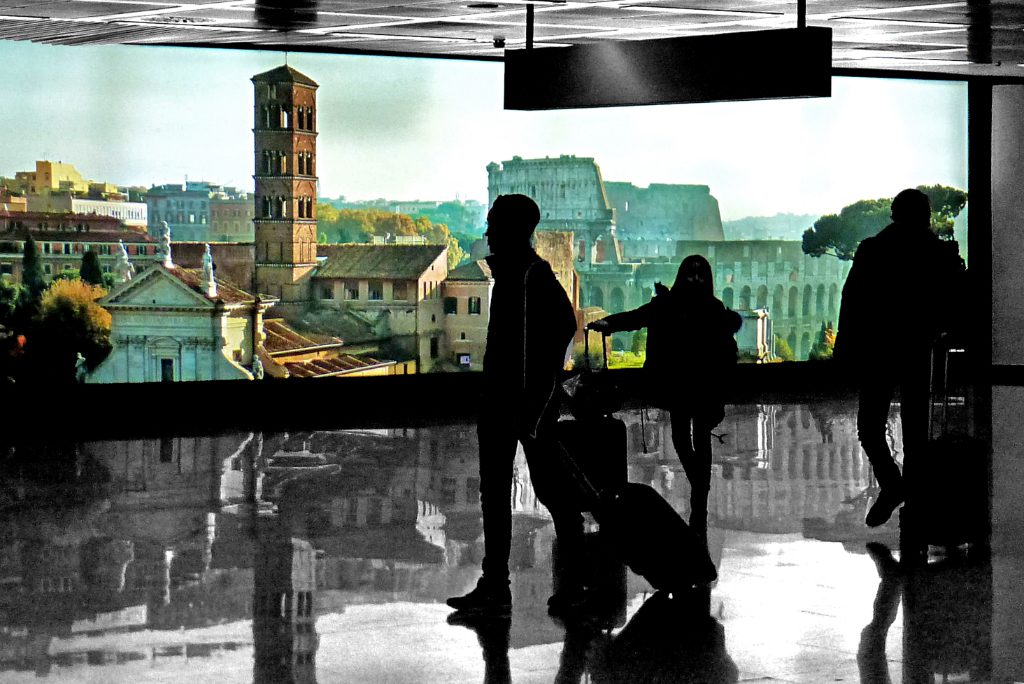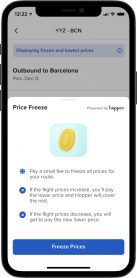Skift Take
Amadeus will distribute Hopper's upsells, such as trip cancellation protection, for consumers to add when buying from airlines and agencies. Seems like B2B2B2C is the new business-to-consumer (B2C).
Online travel agency Hopper has said it makes more money by upselling customers with add-ons, such as trip cancellation protection, than it does from selling travel itself. Now the Montreal-based company has begun distributing these upsell products for airlines, agencies, and others to use, too. Amadeus, the world’s largest travel technology company, said on Tuesday it had become the first distributor of the startup’s products.
The deal between Hopper and Amadeus is part of a new frontier for the travel industry, as many companies invent more creative ancillaries. The underlying trend promises to unlock additional profits for travel suppliers and sellers, while also building traveler confidence to make purchases during an uncertain pandemic.
Amadeus has the right to deploy any of Hopper’s products that a partner requests. For now, it is starting with offering two policies an unnamed online travel agency has asked for in a pilot study. One product is “cancel for any reason” protection, which lets a traveler bail on a flight up to 24 hours before departure and get back most of the ticket price. The other policy is a “price freeze” product that enables a traveler to hold a price for up to two weeks before booking.
Amadeus has no immediate plans to make Hopper’s upsells available in its reservation system used by more than 100,000 “offline” travel agents worldwide until an agency requests it. The company expects first to hear interest from airlines.
“Our biggest business in the insurance unit is working with airline partners to distribute travel insurance on the airline websites,” Altmann said. Many carriers already use the tech giant’s insurance Web services to sell policies to travelers who book tickets directly on airline sites and mobile apps.
Hopper has made big claims about having higher-than-usual attachment rates, or rates of selling the ancillaries along with core travel products. That had piqued Amadeus’s interest.
“When cross-selling traditional travel insurance on an airline website, if you look at a conversion rate, meaning the number booked with insurance as a percentage of the number of tickets sold, eight to 10 percent would be a pretty good conversion rate as an industry standard,” Altmann said.
Hopper said it has seen much higher rates than that through sales on its channels. When provided as an option, nearly 60 percent of travelers booking on Hopper will purchase at least one upsell product.
Two Bigger Trends
Hopper calls its products “fintech,” after the trend in companies offering financial services that use technology but skip the traditional bank structure. (Fintech can also refer to other types of financial engineering, such as how Booking Holdings formally announced a fintech division this month to offer travelers exchange rates and other services without a need for banks.)
A parallel trend is a rise of insurtech. Companies that aren’t traditional insurers are now helping to create insurance-like policies by crunching numbers in ways that new software and new data collection methods, such as mobile phones, make possible. Battleface is one well-known example of an insurance technology company that provides travel insurance services and benefits to travelers visiting or working internationally, including in hard-to-reach places and for adventure travel bookings, with the support of external underwriting.
Amadeus Diversifies Its Insurance Offerings
In October, Madrid-based Amadeus began offering “parametric insurance” policies created by an insurtech named Setoo — which merged this month with another embedded insurtech called Pattern. The products include insurance against flight delays.
Amadeus has begun offering Setoo’s/Pattern’s and Hopper’s products as part of an effort to broaden its selection of upsells. It has long aggregated and distributed traditional insurance policies to travel partners and resellers.
“We decided in 2020 to diversify because, with traditional travel insurance, there’s not much more room to grow,” said Peter Altmann, head of mobility and insurance, Amadeus.
It’s primarily offering Setoo’s/Pattern’s products to offline, retail travel agencies.
Hopper Enters B2B
Hopper has been a consumer-facing company since its founding in 2007, and it began offering its fintech products to consumers in 2018.
By earlier this year, its solutions have been boosting the total transaction size by $40, on average, and generating an average 55 percent greater margin than travel sales.
The startup’s expansion into business-to-business services came out of insight from the pandemic.
“It was an apocalypse at all levels for everybody in travel, but we actually ended up growing revenue 100 percent year-over-year through 2020 on a booking basis that was maybe two-thirds below,” said CEO and co-founder Frédéric Lalonde. “After a few months after the shutdowns, it was obvious we were going to achieve that revenue target because of the [upselling of] financial services.”
Even better, some of the products actually encouraged more sales of travel because of the added assurance they gave.
“Our ‘price freeze’ product massively increases conversion,” Lalonde said. “It’s the biggest conversion driver we’ve ever seen.”
One out of five flight purchases directly on Hopper happened after a customer used a price freeze. The product is a deposit, so if a customer actually goes ahead and books, the money counts toward the full purchase. Only about 13 percent of hotel bookings came after price freezes, which makes more sense because hotel rates are more frequently refundable than plane tickets.
Lalonde said he’s optimistic about a new “missed connection” protection product, too, for its potential to be a conversion tool for flights.
The company decided to try to distribute these services to others. It went down a pathway to become the online agency running sales for CapitalOne’s upcoming travel offering. It also created the tech needed to sell its products using external Web services tied into its databases.
Hopper takes on the risk of covering all the upsell products it sells. Having seen the products survive the once-in-a-century pandemic, the company believes it can manage the risk of any surprise that leads to a sudden surge in, for lack of a better term, payouts.
“Maybe if aliens invade the West Coast for the battle of Los Angeles, we might have a problem,” Lalonde said. “But otherwise, the pandemic gave us all the negative data you could ever want on these products, from a risk-management perspective. It was the mother of all Black Swan events.”
Hopper isn’t the first to try to offer upsell products of this kind, broadly conceived.
Its price freeze product, for example, is similar to a price lock protection that was first offered in 2006 by Farecast, a startup eventually bought by Microsoft and later shut down. Other similar offerings include United’s FareLock; FlightNetwork’s experiment with price drop protection services; a startup that came and went called SteadyFare; a bankrupt startup called OptionsAway that Hopper bought for the intellectual property, which it says it didn’t use; and a price protection consumer offering from a startup called Flyr that has since stopped offering it and pivoted to providing tech services for airlines.
So what’s different this time with price protection?
“We spent six years aggregating airfare data and mapping against anonymous consumer clickstream data and bookings,” Lalonde said. “No one else has a comparable data set that’s as comprehensive. Others only see pieces of the picture.”
“We can build a product where we know more than anybody else about what the price is going to do in the future, even if our understanding is imperfect,” Lalonde said. “We also know more about what behavior will lead to you, as a consumer, to do something that will cost us money.”
“But the main thing that we’ve done differently than anybody else before us is we’ve used machine learning to price every product in real-time,” Lalonde said. “You and I could both run a comparable search, but you might get a different price for the same [fintech product] because of what the app knows about you, such as by inferring behavior from what other searches you’ve done.”
Hopper said it has vetted its products and they’re not classified as insurance. But the company would like to start creating products that are regulated as insurance.
“We’re very interested in building a better version of what’s available,” Lalonde said. “We’ll be playing on all fronts, whether it’s payments, whether it’s insurance, or whether it’s not a regulated product, over the course of the next couple of years.”
In theory, other companies will see what Hopper is doing and move in with copycat products. Hopper’s Lalonde believes his company has a first-mover advantage. Scale will give it more data sooner, which will make its algorithms smarter and enable it to price products in ways that let it share more revenue with its partners than others can.
Yet a potential problem is that Hopper will only be getting partial information when it offers its upsell products to third parties. Airlines, agencies, and others will just be letting the startup know what the transaction price is and not reveal other relevant information about the consumers or the booking patterns on their sites or apps. That may crimp its pricing effectiveness.
Amadeus Optimism
Another aspect of Amadeus’s deal announced today is that Hopper will begin selling Amadeus’ global car rental content.
“Specifically in the North America market, we have added 13 car rental companies, implemented in the past 18 months,” Altmann said. “It’s been driven by us having made significant inroads specifically in North America with our car rental product, with mega-online travel agencies consuming the content from us and making the content on their websites and apps.”
Amadeus is looking for more innovative products to offer as upsells to its partners. But it’s choosy.
“There are some products out there in the market at large that are not necessarily the products which the traveler wants to have,” Altmann said.
“Our focus is to really understand what the traveler is looking for and then being able to go out and get that content,” Altmann said. “We’re already in discussions with other providers, but we’re still trying to qualify the offerings. Are they really what the public wants?”
The Daily Newsletter
Our daily coverage of the global travel industry. Written by editors and analysts from across Skift’s brands.
Have a confidential tip for Skift? Get in touch
Tags: amadeus, ancillaries, fintech, hopper, insurance, online travel agencies, travel insurance, trip insurance, upsell, upselling
Photo credit: A billboard creates an optical illusion in a hallway at Rome–Fiumicino International Airport near Rome, Italy. Amadeus will distribute Hopper's upsell products, such as trip cancellation protection, that consumers can add when buying travel from airlines and agencies. Pom' Angers / Flickr

